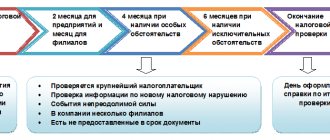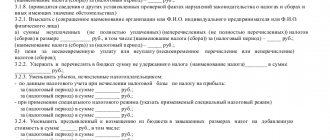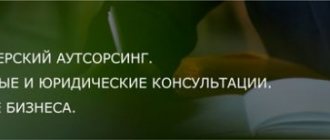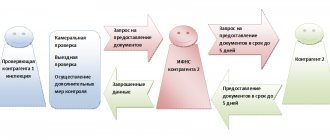What is a suspension of verification?
Suspension of an inspection can only be carried out if there are grounds specified in the law. As a rule, the reason is the need for additional materials. That is, during the pause, tax representatives are not inactive. They send requests to foreign structures and counterparties. However, tax authorities suspend their activities on the territory of the company being inspected.
The standard period for an on-site inspection is 2 months. If a decision is made to suspend, this period is frozen. That is, in essence, the suspension is, in a sense, an extension of the inspection. However, this is not a full extension, since during the pause the company cannot be inspected. That is, the taxpayer will continue to operate. Therefore, suspension is more beneficial for him than extending the inspection period.
What does the suspension regime apply to?
Suspension of scheduled on-site (repeated on-site) tax audits is a ban on carrying out all tax control activities within the framework of such audits.
The suspension applies to the duration of the following events (actions):
- conducting an on-site tax audit;
- suspension of on-site inspection;
- drawing up an on-site inspection report;
- delivery of the on-site inspection report;
- filing objections to the tax audit report;
- review of on-site inspection materials;
- carrying out additional tax control measures;
- drawing up an addendum to the tax audit report;
- delivery of an addendum to the tax audit report;
- filing objections to additions to the tax audit report;
- drawing up an act provided for in Art. 101.4 Tax Code of the Russian Federation;
- filing objections to the act (Article 101.4 of the Tax Code of the Russian Federation);
- consideration of a tax violation case under Art. 101.4 Tax Code of the Russian Federation.
Timing of on-site activities
The duration of on-site events is stipulated in paragraph 6 of Article 89 of the Tax Code of the Russian Federation. In particular, it is 2 months. However, the timing may be different under the following circumstances:
- Inspection of branches and representative offices. The period is reduced to one month.
- There is a corresponding decision from the inspectors. Those conducting the inspection may decide to extend the event. This decision can be made up to two times. The maximum extension period is 2 months.
The longest duration of an inspection is 6 months (2 months is the standard period, 4 months is an extension based on two decisions of the inspectors). The period begins to count from the date of the decision to initiate an inspection on the basis of paragraph 8 of Article 89 of the Tax Code of the Russian Federation. It ends on the date the final inspection certificate is issued.
Grounds for suspension
The grounds for suspension are stated in paragraph 9 of Article 89 of the Tax Code of the Russian Federation. Let's look at them:
- The need to request information from foreign structures. Tax authorities may need to request data from government agencies in other countries. This is required, for example, to prevent double taxation. Sending a request and receiving a response to it is a lengthy process based on international agreements. Therefore the event is suspended.
- The need to organize an examination. Sometimes tax authorities may require additional information. In this case, an examination is appointed, after which a professional opinion is issued. It is regulated by Article 95 of the Tax Code of the Russian Federation.
- The need to contact translators. The documents being verified may be written in a foreign language. In this case, you need to resort to the services of a translator. The translation is performed on the basis of Article 97 of the Tax Code of the Russian Federation.
- Need for additional documents. Sometimes tax authorities request papers (agreements, payments) from counterparties of the organization being audited. This stage is carried out on the basis of Article 93.1 of the Tax Code of the Russian Federation.
That is, the verification is suspended when it cannot be continued due to the lack of additional materials. To prevent downtime, the event is paused. During the suspension, tax authorities take all necessary additional actions.
IMPORTANT! Suspension can be carried out any number of times if there are grounds for it.
However, if it is carried out on the basis of the need to request documents from counterparties, then it is impossible to stop the work of the tax authorities on the same basis again. However, you can pause the process when specialists turn to another counterparty. Suspension is assigned as many times as tax representatives need. However, its total duration cannot exceed 6 months.
We explain the procedure for extending and suspending the period for conducting an on-site tax audit
Publication date: 07/17/2013 14:47 (archive)
The procedure and timing of an on-site tax audit are regulated by Art. 89 of the Tax Code of the Russian Federation (hereinafter referred to as the Code). According to paragraph 6 of Art. 89 of the Code, an on-site tax audit cannot last more than two months. This period can be extended to four or six months (clause 6 of Article 89 of the Code), and also suspended for a period of up to six (nine) months (clause 9 of Article 89 of the Code). Extension of the deadline should be distinguished from the suspension of an on-site tax audit. When the inspection period is extended, the activities carried out by tax authority officials are not interrupted; the inspection period is not suspended, but extended. To extend the deadline for conducting an on-site tax audit, the tax authority conducting the audit sends a reasoned request in advance (before the deadline for the audit expires) to a higher tax authority. The higher tax authority makes a decision to extend the deadline. The tax authority conducting the tax audit continues to carry out all audit activities for up to four or six months, depending on how long the audit period is extended. The list of grounds and procedure for extending the period for conducting an on-site tax audit were approved by Order of the Federal Tax Service of Russia dated December 25, 2006 N SAE-3-06/ [email protected] taking into account the changes approved by Order of the Federal Tax Service of Russia dated July 23, 2012 No. ММВ-7-2/ [email protected] The grounds for extending the period for conducting an on-site (repeated on-site) tax audit to four and (or) six months may be: 1) conducting inspections of a taxpayer classified as the largest; 2) receiving, during an on-site (repeated on-site) tax audit, information from law enforcement, regulatory authorities or other sources indicating that the taxpayer, fee payer, tax agent has violated the legislation on taxes and fees and requires additional verification; 3) the presence of force majeure circumstances (flooding, flooding, fire, etc.) in the territory where the inspection is carried out; 4) conducting inspections of organizations that have several separate divisions, namely: four or more separate divisions - up to four months; less than four separate divisions - up to four months, if the share of taxes paid attributable to these separate divisions is at least 50 percent of the total amount of taxes paid by the organization, and (or) the share of property on the balance sheet of separate divisions is at least 50 percent of the total value of the organization’s property; ten or more separate units - up to six months; 5) failure by the taxpayer, fee payer, or tax agent to submit, within the time limit established in accordance with paragraph 3 of Article 93 of the Code, the documents required to conduct an on-site (repeated on-site) tax audit; 6) other circumstances. The list of grounds for making a decision to extend the period of an on-site inspection is not exhaustive and depends on specific circumstances. The need and timing for extending an on-site (repeated on-site) tax audit are determined based on the duration of the period being inspected, the volume of documents being checked and analyzed, the number of taxes and fees for which the audit is ordered, the number of activities carried out by the inspected person, the ramifications of the organizational and economic structure of the inspected person, the complexity technological processes and other circumstances. If an on-site tax audit is suspended, the audit period is suspended. Clause 9 of Art. 89 of the Code provides for an exhaustive list of grounds for suspending an on-site tax audit, as well as the procedure for suspending and resuming an on-site tax audit. The total period of suspension of an on-site tax audit cannot exceed six months. If the inspection was suspended in order to obtain information from foreign government bodies within the framework of international treaties of the Russian Federation and within six months the tax authority was unable to obtain the requested information from the specified foreign government bodies, the period of suspension of such an audit may be increased, but not more than for three months. The tax authority that conducts an on-site audit may suspend it (clause 9 of Article 89 of the Code). This means that the verification period is suspended. After the inspection is resumed, the period continues to run. During the period of suspension, officials conducting an on-site tax audit must (paragraph 9, clause 9, article 89 of the Code): - leave the territory (premises) of the taxpayer being inspected; — suspend actions to request documents from the taxpayer being audited. During the period of suspension of the audit, the tax authority may request documents and information from third parties in the manner established by Art. 93.1 of the Code. After all, such actions are carried out outside the territory (premises) of the taxpayer and are not prohibited by the Tax Code of the Russian Federation. An on-site audit can be suspended only in strictly defined cases, when tax authorities need (clause 9 of Article 89 of the Code): 1) to obtain information from foreign government agencies within the framework of international treaties of the Russian Federation; 2) conduct examinations (Article 95 of the Code); 3) translate into Russian the documents submitted by the taxpayer in a foreign language (Article 97 of the Code); 4) request from the counterparty of the taxpayer being inspected or from other persons documents (information) that relate to the activities of this taxpayer (clause 1 of Article 93.1 of the Code). The tax authority can suspend an audit more than once. However, there are two restrictions that must be observed. The first limitation is the limitation on the total period of suspension of the on-site inspection, which cannot exceed six months (paragraph 8, paragraph 9, article 89 of the Code). The second limitation is related to the suspension of the inspection under paragraphs. 1 clause 9 art. 89 of the Code for requesting documents (information) from the counterparty. The tax authority can suspend an audit on this basis no more than once for each such person (paragraph 6, paragraph 9, article 89 of the Code). The inspection is suspended from the date specified in the decision on suspension. The inspection is resumed from the date specified in the decision to resume the inspection.
Duration of suspension
The total period of suspension cannot exceed 6 months. In some cases, the period may be extended for another 3 months. However, this is only possible if the tax authorities previously sent a request to foreign authorities and did not receive a response from them within six months.
The suspension is carried out on the basis of a relevant decision. It specifies the start date of the pause. The suspension ends when a decision is made to resume the event.
FOR YOUR INFORMATION! Sometimes the pause dates may be violated. However, it is difficult to hold tax authorities accountable for this, since the violation is considered minor.
Features of suspending an event
The procedure for suspension is specified in Article 89 of the Tax Code of the Russian Federation. The decision to pause is made by the head of the Federal Tax Service or his deputy. The form of this decision is contained in Appendix No. 5 to the Order of the Federal Tax Service No. ММВ-7-2 / [email protected] dated May 8, 2015. However, this form is not mandatory. If the document is drawn up in any form, this will not be an offense.
Paragraph 9 of Article 89 of the Tax Code of the Russian Federation states that suspension involves pausing these processes:
- Request for documents. During the suspension process, the company returns all original papers that were sent for verification earlier. The exception is papers obtained during seizure.
- Operations carried out on the territory of the audited company. All activities in the company area stop.
The law specifies only these actions. That is, all other operations can be carried out during the suspension process. They are carried out in a standard manner.
Formation of a solution
The decision to suspend shall indicate the full name of the head of the inspection object. He needs to be familiarized with the document. The decision must also indicate the start date of the shutdown and the date of resumption of work. The timing of the pause must be determined precisely. This requirement is necessary to protect the rights of the audited company.
Moratorium on inspections
According to Federal Law No. 98-FZ of April 1, 2021, inspections regulated by Federal Law No. 294-FZ of December 26, 2008 are not carried out from April 1 to December 31, 2021.
They are not carried out only in relation to legal entities, individual entrepreneurs classified as SMEs, information about which is included in the Unified Register.
At the same time, according to Decree of the President of the Russian Federation of April 2, 2020 No. 239, government bodies continue to function.
Therefore, inspections of companies and individual entrepreneurs that are not subject to the moratorium can be carried out at any time. And inspections scheduled before the introduction of the moratorium, but not completed by April 1, 2020, inspectors will try to complete, excluding, however, direct contact with the person being inspected and his employees.
Tax audits are not included in the audit moratorium.







